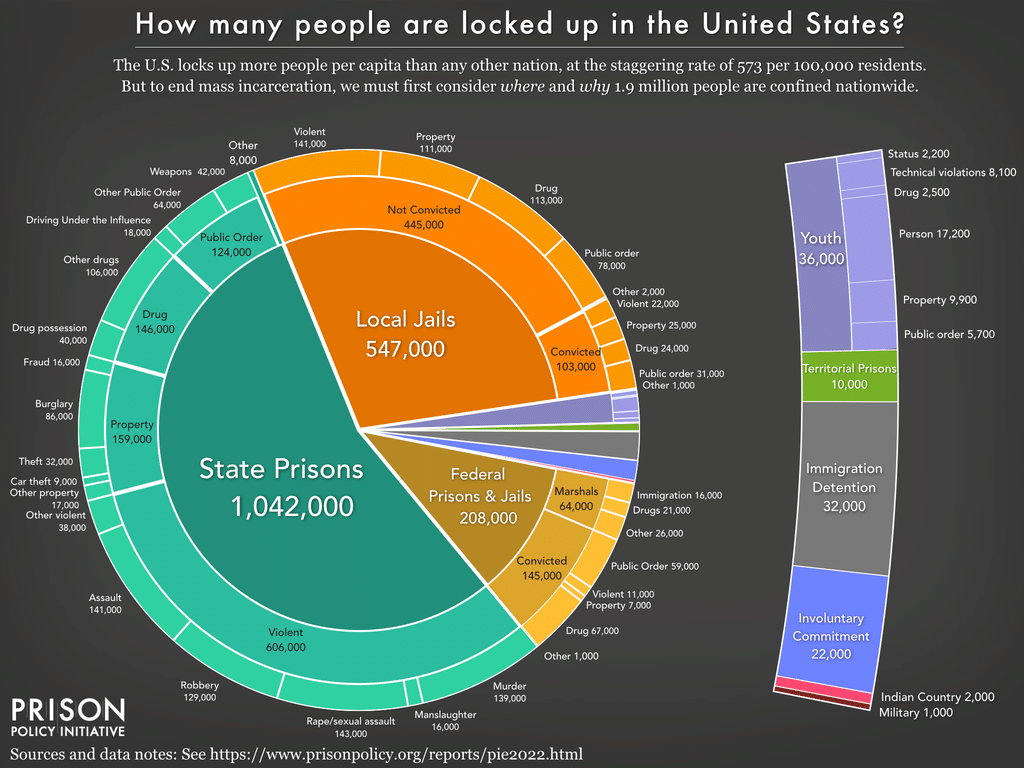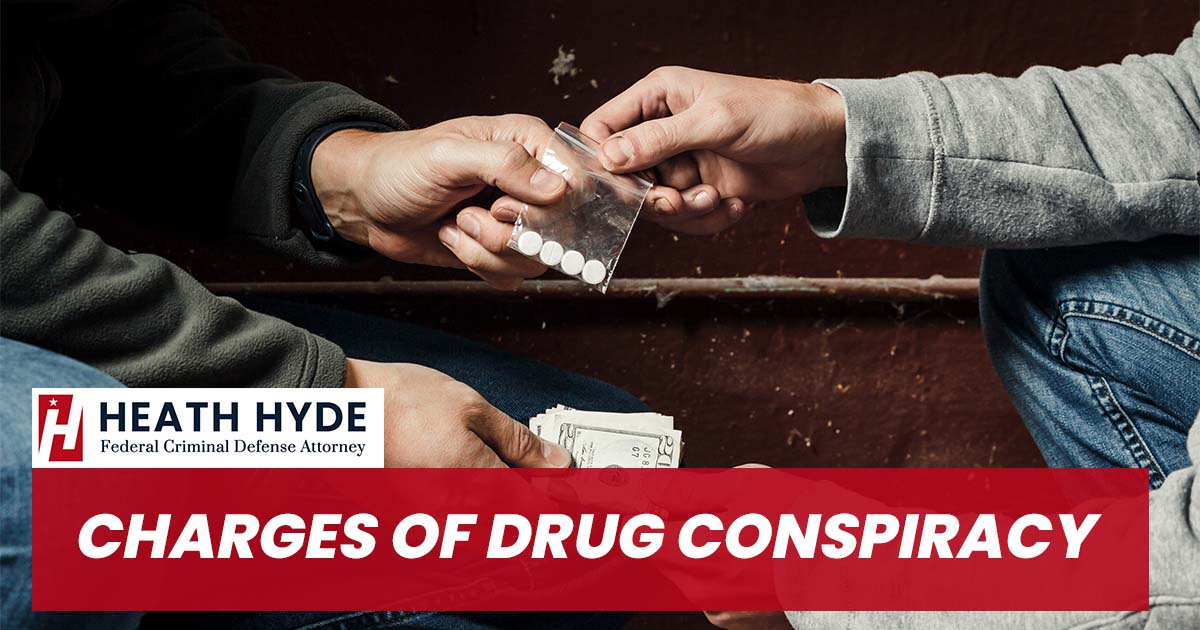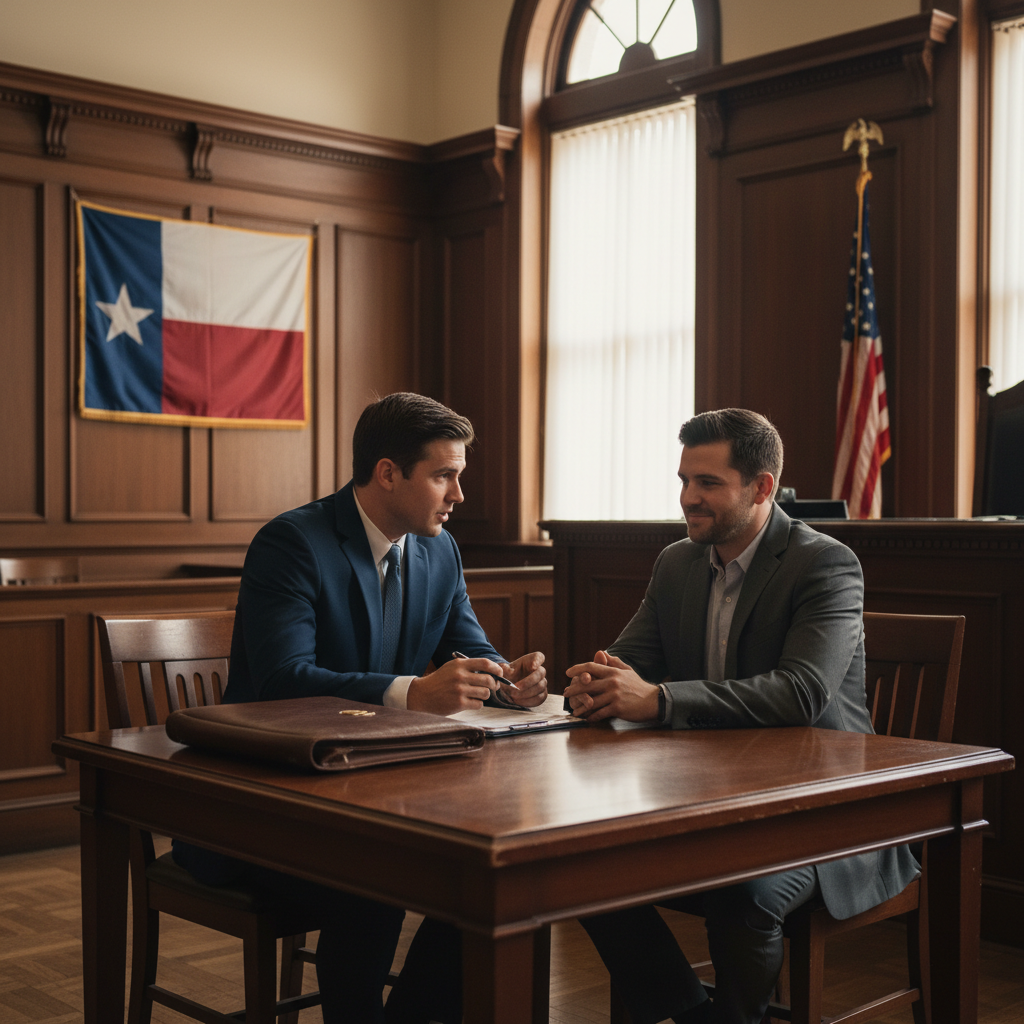A drug conspiracy is defined as a two- or more-person agreement to commit a drug offense. A federal drug conspiracy is a group of people who have agreed to break federal drug laws.
The government must show two things to prove a person is guilty of drug conspiracy charges:
(1) there was an agreement between two or more people to break a federal drug law; and
(2) each accused conspirator was aware of the unlawful agreement and participated in it.
Drug Conspiracy Charge Types

Under 21 U.S.C. 841 and 21 U.S.C. 952, there are four types of drug offenses:
1. Manufacturing a controlled substance – From growing a marijuana plant to pressing pills, “manufacturing” can refer to any action associated in the production, processing, preparation, or extraction of a controlled material.
2. Distributing a controlled substance — This refers to the act of supplying a prohibited substance to someone, even if no money is exchanged.
3. Having a controlled substance with the intent to distribute it — Having an illicit drug is a different offense than making or distributing it. If the authorities can show that a person had the intent to distribute the narcotics in their possession, the penalties are the same as if they did so. Prior drug sales, possession of equipment such as scales and baggies, and even the amount of narcotics in a person’s possession can all be used as proof of an intent to distribute by the government. The government can charge someone with having the intent to distribute marijuana if they are caught with five pounds of marijuana, for example.
4. Importing a controlled substance — Similar to distribution, this is a simple felony involving the unlawful importation of drugs into the United States, usually by tricking US Customs or Border Patrol.
What Are the Consequences of Being Charged With a Drug Conspiracy?
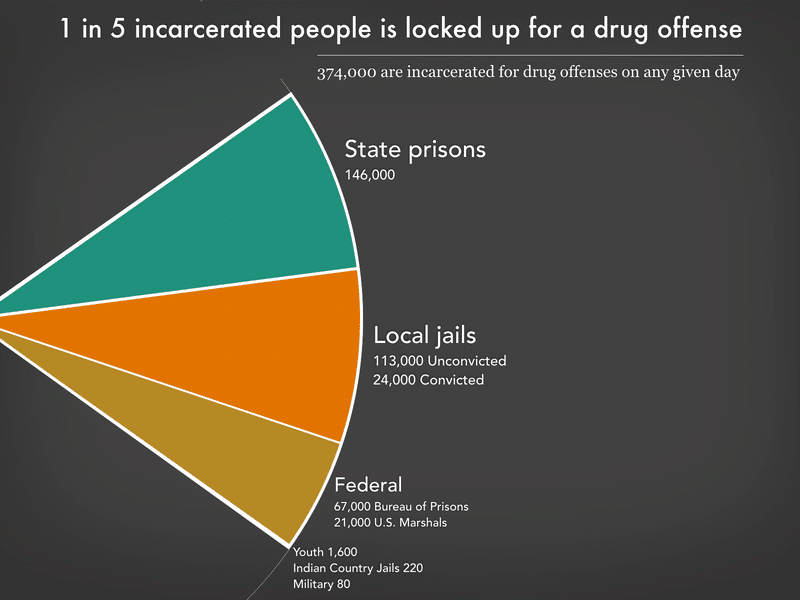
Participating in a drug conspiracy carries a range of penalties depending on the type and quantity of narcotics involved.
There is no statutory minimum term for marijuana if there is no quantity of marijuana alleged, however the maximum sentence is 20 years. There is a mandatory minimum sentence of 5 years and a maximum term of 40 years if there is 100 kilograms or more of a substance containing marijuana. There is a mandatory minimum punishment of 10 years in jail and a potential term of life in prison if there are 1000 kg or more of a material containing marijuana.
There is no obligatory minimum term for cocaine and “crack” cocaine if the quantity of cocaine or crack cocaine is not specified, but the maximum punishment is 20 years. There is a mandatory minimum penalty of 5 years and a maximum term of 40 years if there is 500 grams or more of a substance containing cocaine or 28 grams or more of a material containing crack cocaine. There is a mandatory minimum sentence of 10 years in jail and a maximum term of life in prison if there are 5 kilos or more of a drug containing cocaine or 280 grams or more of a material containing crack cocaine.
There is no statutory minimum sentence for methamphetamine if the quantity of methamphetamine is not mentioned, however the maximum punishment is 20 years. If a material containing methamphetamine contains 5 grams or more, a mandatory minimum term of 5 years and a maximum sentence of 40 years applies. There is a mandatory minimum sentence of 10 years in jail and a potential term of life in prison if there are 50 grams or more of a drug containing methamphetamine.
There is no mandatory minimum term for heroin if the quantity of heroin is not mentioned, however the maximum punishment is 20 years. There is a mandatory minimum penalty of 5 years and a maximum term of 40 years if there is 100 grams or more of a drug containing heroin. If 1 kilogram or more of a heroin-containing drug is found, a mandatory minimum penalty of 10 years and a maximum sentence of life in prison is imposed.
Drug conspiracies involving opioids, particularly fentanyl and fentanyl analogues, are now being investigated by law enforcement. A chemical compound that is “substantially similar” to a prohibited substance, both in its structure and in the effects, it produces when taken, is called an “analogue.”
Fentanyl is a Schedule II substance; however, a fentanyl analogue is a Schedule I drug. For narcotics crimes involving fentanyl or fentanyl analogues, there are no obligatory minimum punishments.
Possibilities for Improvement in Drug-Conspiracy Cases
It’s critical to be aware of rules that “increase” the penalties for specific drug offenses. The mandatory minimum penalties for drug conspiracy convictions have been drastically increased as a result of these regulations.
The government can implement these improvements in two ways:
1. If a person dies or suffers significant injury as a result of utilizing the controlled substance used in the drug conspiracy. This enhancement can be used only if the government can show that the deceased person would not have died or been wounded if they had not eaten the restricted substance implicated in the violation.
2. If the person charged with a drug offense has had one or more prior felony drug convictions. The government must notify the court and the defendant that it is seeking an enhancement, and it must specify which past convictions it is relying on under 21 U.S.C. 851.
In several federal drug conspiracy trials, Heath Hyde obtained “not guilty” judgments.
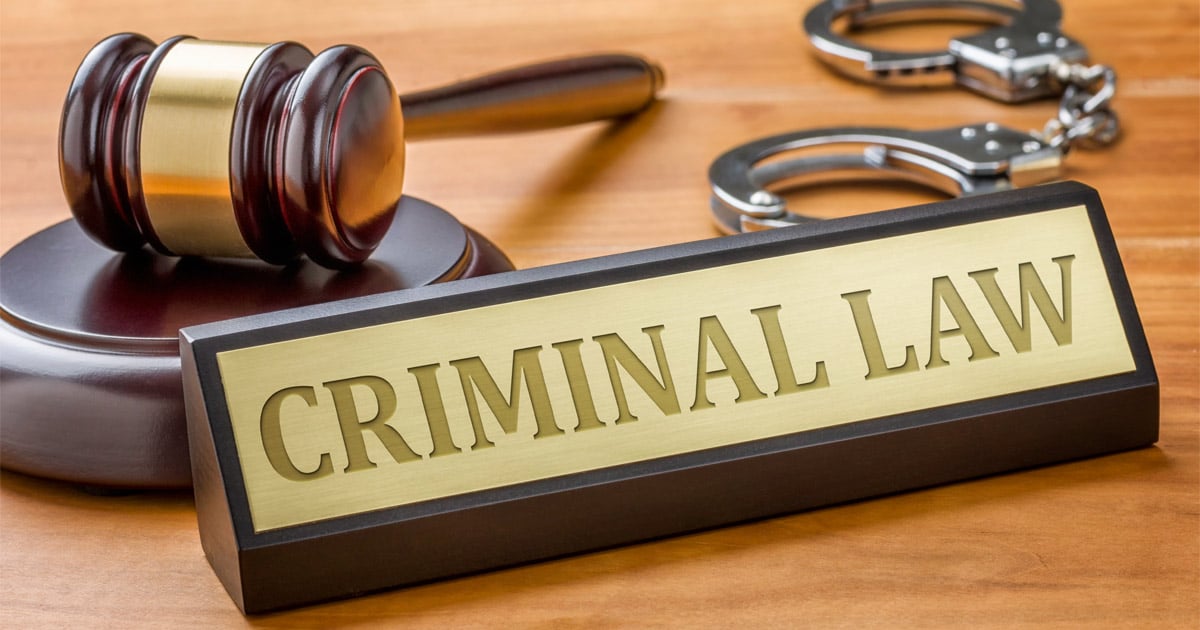
Heath Hyde is regarded as one of the top federal drug conspiracy defense lawyers in the United States. He has a twenty-year track record of success defending clients accused of federal narcotics conspiracy charges in federal courts around the country.
Throughout the United States, we have successfully represented clients in federal criminal trials. Our firm has offices in Atlanta, Alexandria, and Washington, DC, and we routinely travel to other federal courts to represent persons charged with significant federal crimes.
People choose us from all over the country when they require a law company that specializes in federal drug conspiracy statutes and has a track record of successfully defending tough federal drug matters at trial. Our firm has been able to win federal criminal trials regardless of where the matter is pending since the criminal laws and rules of evidence are essentially the same in all federal courts.
Defending Against a Drug Trafficking Charge
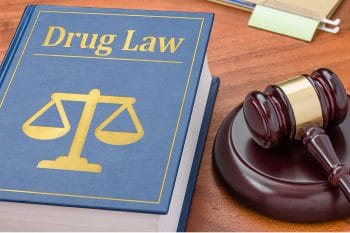
Drug conspiracy crimes have six basic defenses:
1. There was no agreement — This is a simple defense asserting that the government is unable to prove the existence of a conspiracy. When the parties involved do not share a common aim and do not collaborate, for example, there is no agreement. Similarly, numerous people may come together to do something, but if the goal isn’t illegal, the agreement isn’t a conspiracy.
2. The defendant had no intention of signing the agreement – This defense, like the claim that there was no agreement, criticizes the government’s case as being devoid of evidence. In order for there to be a conspiracy, one must join it on purpose. This entails participating in the conspiracy in a “overt” manner. Jim and Bob may joke about robbing a bank, and Bob may go out the next day and actually do it, but Jim is not guilty of conspiracy to rob a bank if he believes Bob is kidding and does not take any steps to assist him in robbing the bank, such as obtaining a getaway car.
3. The person charged was involved in a different conspiracy – It may seem counterintuitive, but a person has a valid defense if the conspiracy they are involved in is not the same as the conspiracy with which they have been charged. The government may accuse someone of spreading heroin from their home, but if they were actually distributing marijuana, that is a valid defense to the government’s charges.
4. The accused dropped out of the conspiracy – Withdrawing from a conspiracy is a defense, but it isn’t enough to just throw up one’s hands and declare, “I quit.” A person must have been proactive in withdrawing from the conspiracy in order to succeed with a withdrawal defense. This entails demonstrating that they voluntarily stopped participating in the conspiracy, told your co-conspirators of their decision, and withdrew before the scheme was completed. It can also indicate that a person who is withdrawing must take actions to prevent the conspiracy from achieving its criminal goal, such as informing police enforcement.
5. Law police entrapped the person charged — While this is a difficult defense to win, it can be effective when employed effectively. Entrapment occurs when law enforcement “traps” a person by persuading them to commit a crime they would not have committed otherwise. The key to proving entrapment is demonstrating that the defendant would not have committed the crime if the government hadn’t enticed them. It is not entrapment if an undercover agent or government informant creates an opportunity for a person to sell him drugs, but it is entrapment if they threaten, harass, or compel that person to sell illegal substances. Entrapment is comparable to duress, a defense that can be used if someone is physically threatened into doing something wrong.
6. There was an illegal search or interrogation – We are protected from “unreasonable searches and seizures” under the US Constitution. This implies that before wiretapping a person’s phone, searching their home for narcotics, or pulling them over to check their car, law officers must have a proper search warrant. If you are detained, police enforcement must read you your Miranda rights, which include the right to stay silent and not incriminate yourself.
If the person charged can show that the warrant for a wiretap or search of their home is not supported by probable cause, or that law enforcement conducted a traffic stop without having any reasonable suspicion that the person committed a crime, they can ask a court to suppress evidence seized by law enforcement, which means the government will not be able to use it against them in their case. In drug cases, this usually means the government is unable to present the narcotics as evidence, therefore ending their case. Similarly, if a person can show that they were not informed of their right to remain silent by law enforcement, any self-incriminating words they made will be suppressed.
It’s also a good idea to check to see if any searches that resulted in the finding of drugs, cash, or other evidence were legal. If evidence is located in a vehicle, the attorney must decide whether the police who stopped the vehicle had a valid justification for doing so, or whether the person in possession of the vehicle gave voluntary agreement. If narcotics are located in a house, the attorney must confirm that the search was conducted on the authority of a valid search warrant or other reasonable suspicion or consent. If a person’s rights were violated by the police, a judge may order that any evidence seized be suppressed.
A person charged of a drug conspiracy or another federal drug felony has a number of other possible defenses. An affirmative defense, such as entrapment or duress, may be accessible and successful in some circumstances if pursued diligently. Depending on the facts of the case, a qualified lawyer will also assess whether additional affirmative defenses apply.
If you’ve been charged with a federal drug felony, such as conspiracy, you’ll need the help of a federal criminal lawyer who knows how to protect your legal rights. Our company has successfully represented individuals accused of federal narcotics conspiracy and associated felonies for many years. We’ve won several federal drug trials and negotiated favorable pre-trial judgments and plea deals in others.
To stay up to date on current cases and significant developments in federal criminal law, subscribe to The Federal Docket.
Property Forfeiture and Seizure in Drug-Conspiracy Cases
Even if a person is never convicted of a federal narcotics felony, being charged with one can result in the seizure and forfeiture of property. Any property derived from a drug-related crime would be forfeited, according to the authorities. Furthermore, any property used or intended to be used in the commission or facilitation of such a crime will be forfeited. Any interest or privileges in an ongoing criminal enterprise will be forfeited by a person convicted of engaging in one.
The government can confiscate and hold any property and money in a person’s possession that was “obtained, directly or indirectly, as a result of” a drug violation, as well as any property used “to facilitate the commission of” such an offense, under 21 U.S.C. 853. In forfeiture cases, the government does not have to establish beyond a reasonable doubt that the offender received the property from a criminal source or that they utilized the property in conjunction with their alleged crimes, as is the case with criminal convictions.
There are, of course, ways to challenge a forfeiture or seizure of property. Our firm successfully negotiated the restoration of our client’s property and currency that had been confiscated by federal law enforcement and has won criminal forfeiture proceedings.
